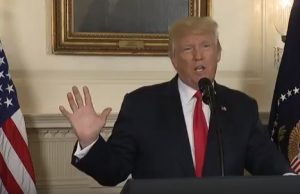Trumped By 'Covfefe': 3 Reasons Why Trademarking Trending Names And Catchphrases Is A Bad Idea
Why opportunistic plots to register trademarks for trending terms almost always fail.
Ed. note: Please welcome Tom Kulik, one of our new columnists focusing on intellectual property law.
Sometimes reality provides the best fiction. In the midnight hour of May 31st of this year, President Donald Trump posted a tweet containing the now-infamous term “covfefe.” Although the tweet was later deleted from his Twitter feed, someone filed a federal trademark application for the phrase “Covfefe Coffee” by lunchtime, and little more than two weeks later a total of 32 federal trademark applications were filed by numerous applicants containing the term “Covfefe.”

Law Firm Business Development Is More Than Relationship Building
Looking to capitalize on trending terms and catchphrases is not a new phenomenon, but when you combine the intense persona of President Trump (and the strong reaction to him among the electorate) with the exponential reach of social media, the practice evolves to a whole new level. Unfortunately, such opportunistic steps to register such terms with the USPTO or otherwise commercialize them almost always fail… and for reasons much more concrete than those given by President Trump for the apparent tweet mishap.
Trademarks are defined under the Lanham Act as follows:
[A]ny word, name, symbol, or device, or any combination thereof… used by a person, or… which a person has a bona fide intention to use in commerce to identify and distinguish his or her goods, including a unique product, from those manufactured or sold by others and to indicate the source of the goods, even if that source is unknown.
15 U.S.C. § 1127.
Sponsored

Generative AI at Work: Boosting e-Discovery Efficiency for Corporate Legal Teams

Curbing Client And Talent Loss With Productivity Tech

Happy Lawyers, Better Results The Key To Thriving In Tough Times

Generative AI at Work: Boosting e-Discovery Efficiency for Corporate Legal Teams
So, not only do trademarks distinguish the owner’s goods and services from those of another through use, but they must also act as a source identifier. These elements are essential not only to obtain federal registration status, but to maintain, protect, and police such rights.
There is no shame in trying to capitalize on a trend, but when trying to monetize trending terms and catchphrases, trademark law and the USPTO are most definitely not on your side. Here are three of the biggest misunderstandings about trademarking and commercializing such terms and catchphrases:
- A Trademark Is A Source Identifier, NOT A Decoration. Most all opportunistic federal trademark applications fail on this ground. Since a trademark must be a source identifier, the mark must be associated with the trademark owner and not with a third party. As a result, trending terms and phrases are usually associated with the person who originally used them – in the case of “You’re Fired” and “covfefe,” President Trump himself… not the aspiring applicant. Furthermore, you can’t simply throw a term or catchphrase on a t-shirt or baseball cap and claim it as your mark – such use of the term or phrase would likely be deemed an “ornamental design” by the USPTO and be ground for rejection of the application. See 15 U.S.C. §§ 1051, 1052, 1127. Such a rejection would be impossible to overcome unless the applicant could provide a substitute specimen showing trademark use (which is highly unlikely in this context).
- Bona Fide Intent To Use The Mark Is Necessary, NOT A Hope That It Catches On. Trademarks obtain such status from use in commerce. Although an applicant can seek to obtain federal trademark registration if they have a bona fide intent to use the term or phrase in commerce, marks filed on that basis are not granted registration until specimens of actual use in commerce are provided. Most opportunists think that they can just license the mark to a third-party for them to commercialize the mark, but this simply does not happen in practice because there is nothing that prevents the third-party from doing so themselves – they are already doing business in the designated market space, and there are usually no prior actual trademark rights upon which the applicant can claim priority (other than a filing date for an application which may not ripen into a registration). Bottom line: If they (or their licensee) don’t use the mark, they can’t get a registration for it.
- You Can’t Police What You Can’t Protect. Trademark use is of paramount concern in trademark law. If a trending term or catchphrase actually catches on in pop culture, having a federal trademark registration is no guarantee that you can actually defend the mark. Once pop culture starts adopting such terms and catchphrases, seniority of use is vitally important (as the senior user of a trademark can generally “trump” (no pun intended) a junior user’s rights in the mark in the market space). In most cases, the applicant is NOT the senior user, and proving otherwise can be complicated and costly. Moreover, the term or catchphrase can become so widely known as to become “generic” and not worthy of trademark protection at all, because genericness destroys the ability of a mark to act as a source identifier. Of course, one can simply avoid the federal registration process and use the mark at common law, but policing such marks is far more difficult because, inter alia, there is no presumption of validity (requiring the owner to prove the validity of the mark), no automatic federal court jurisdiction, and no constructive notice to the whole country of the use of the trademark (as common law rights are highly geographic in nature and generally extend only to where one can prove such goods were sold and/or services were provided). Policing common law marks on the internet as well as in other forms of media is not only daunting, but can be quite costly, with a questionable likelihood of success.
These misconceptions are illustrative and by no means exhaustive… but you get the point. The costs of registering or otherwise using such terms and catchphrases almost always outweigh any perceived benefits. Rather than making money by capitalizing on a trend in pop-culture, such entrepreneurs usually end up losing money instead.
So… the next time you are confronted with a request to trademark trending terms or catchphrases, don’t feed the knee-jerk reaction to register them. If you do, you may just end up on the receiving end of a well-known Trump catchphrase yourself.
Sponsored


Law Firm Business Development Is More Than Relationship Building
 Tom Kulik is an Intellectual Property & Information Technology Partner at the Dallas-based law firm of Scheef & Stone, LLP. In private practice for over 20 years, Tom is a sought-after technology lawyer who uses his industry experience as a former computer systems engineer to creatively counsel and help his clients navigate the complexities of law and technology in their business. News outlets reach out to Tom for his insight, and he has been quoted by national media organizations. Get in touch with Tom on Twitter (@LegalIntangibls) or Facebook (www.facebook.com/technologylawyer), or contact him directly at [email protected].
Tom Kulik is an Intellectual Property & Information Technology Partner at the Dallas-based law firm of Scheef & Stone, LLP. In private practice for over 20 years, Tom is a sought-after technology lawyer who uses his industry experience as a former computer systems engineer to creatively counsel and help his clients navigate the complexities of law and technology in their business. News outlets reach out to Tom for his insight, and he has been quoted by national media organizations. Get in touch with Tom on Twitter (@LegalIntangibls) or Facebook (www.facebook.com/technologylawyer), or contact him directly at [email protected].








